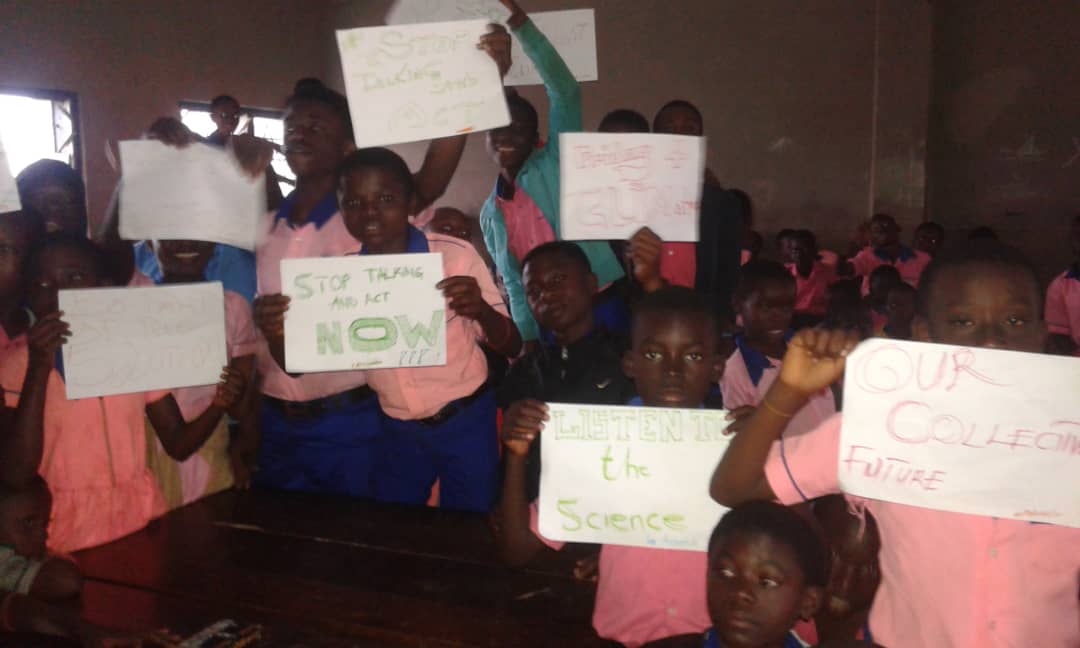20th September, 2019 might go down in history as the day when humanity finally got down to brass tacks; a day when we paused and admitted that our rush hours lead only to a dead end until the climate crises is resolved. Today, humanity is collectively pulling the breaks on a planet that is currently being driven towards doom.
(Above) Volunteers of Edu Spots visited schools to sensitize them on the climate crises and to raise the awareness among both teachers and students
By chance or design, humans have risen the highest on the evolutionary ladder, and [through the ingenuity that accompanies this] have transitioned from the most successful gatherers, through the fiercest hunters to the bandwagons of the agricultural revolution. Throughout this transitioning, however, we never endangered ourselves until we discovered oil, and as we burnt it to power machines that replaced horse-power, we broke the carbon strands of a once unknown liquid, emitting in the process, Greenhouse gases (GHG) that lethally enhance the greenhouse effect: Today, by virtue of human activities, global temperatures are 1 degree Celcius above pre-industrial era [IPCC, 2018].
And at only 1 degree celcius rise in global temperatures, the earth is already turning increasingly uninhabitable; the oceans are more turbulent, icebergs that served as habitats to polar bears are melting, the winds are stormier, and the rains more difficult to predict. We may choose to deny the science, but the signs are too clear to ignore. And for regions (such as Africa) that depend largely on rain-fed agriculture, unpredictable rains mean lesser crop yields. This is the unfair part of the crises: Regions which contributes less to the effect are the most vulnerable and most affected, mainly because they are the most technologically-handicapped to adapt to, and mitigate the crises [Oladayo Nathaniel Awojobi et al, 2017].
 But the climate crises do not only affect agricultural output and prone us to natural disasters, it has everything to do with peace and security too; 2.6 billion people are at the risk of armed war and conflict related to climate change [Robert Goodland, 2008].
But the climate crises do not only affect agricultural output and prone us to natural disasters, it has everything to do with peace and security too; 2.6 billion people are at the risk of armed war and conflict related to climate change [Robert Goodland, 2008].
The good news is, the solution is within our reach. The radar points precisely at sectors that offer the greatest opportunities for carbon savings: The energy supply chain is the greatest contributor to GHG emissions, accounting for 35% of human-induced GHG emissions [Thomas Bruckner et al, 2013]; Deforestation also accounts for 25% of global GHG emissions [Lauren Bennett, 2017] and transport as a whole accounts for 23% of global GHG emissions [Georgina Santos, 2017]. Collectively, these three sectors – energy, deforestation and transport – are responsible for over 83% of GHG emissions. So based on the science and evidence, we cannot overcome the climate crises until we shift our energy sources from conventional fossil fuels to renewable energy; conserve our existing forest resources whilst embarking on reforestation; and encourage carpooling and adopt telecommuting, at least.

For a crises that, in its most generous form, threatens the quality of our air and water, food supply and shelter, climate change can no longer be left as a topic of interest only to the Inter-Governmental Panel on Climate Change (IPCC). And by ‘our’, I refer not just to us humans – an otherwise relatively fewer species in the grander eco-system of living things – but to the entirety of flora and fauna into which we fit, and on which we depend as humans. The science of climate change has earned the least favour among politicians and cooperation (who undoubtedly have the biggest platform to significantly change our current trajectory for the better) because acting on the science means being a little less greedy, a little less comfortable.
For each of the solutions well-known to us, we have the technical know-how and the resources to implement. It is a lack of will and conscience that seems missing. This is the course that has forced young people out of the classrooms, civil servants off work and farmers off their farms and onto the streets, to toll alarm bells for action whilst there is still enough oxygen to breathe, food to eat, and shelters to retire to.
By:
Ali Eliasu
Head of STEM and Sustainability, Edu Spots.







